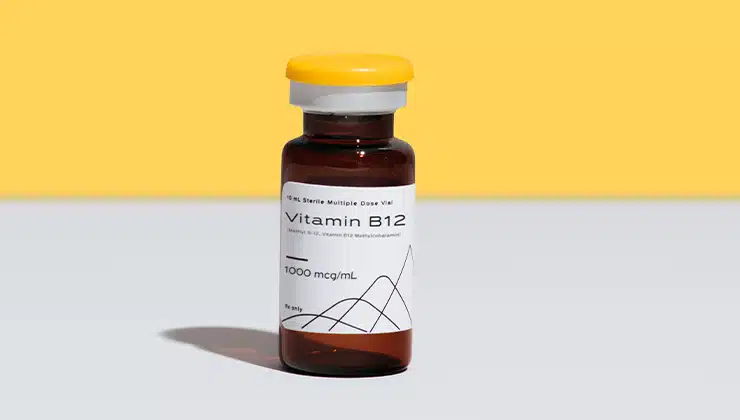Five Folic Acid Benefits No Sane Man Can Ignore
30-Second Takeaway
Folic acid, a better-absorbed form of vitamin B9, may boost fertility in men. It also promotes heart health, and cognitive function, and may prevent cancer.
O
ther B vitamins—like vitamin B12 and B6—seem to get all the hype for their longevity benefits, which span from improving cognitive function and energy levels to staving off oxidative stress and maintaining your DNA. But research shows another B vitamin—vitamin B9—boasts incredible lifespan- and healthspan-boosting benefits for men that you shouldn’t ignore.
Your body uses B9 for DNA maintenance and repair, and healthy cell growth (1). Your body can’t make B9 on its own, so you have to get it through folic acid supplements or folate-rich foods.
What Is Folic Acid?
Folic acid is the man-made form of folate, the naturally occurring form of B9 found in foods like spinach, asparagus, and legumes, says Kelsey Costa, MS, RDN, a registered dietitian and nutrition consultant for the National Coalition on Healthcare.
While both provide essential nutrients, folic acid is generally better absorbed and utilized by the body than its natural counterpart, folate (2).

ABOUT THE EXPERT
Kelsey Costa is a registered dietitian nutritionist, consultant for the National Coalition on Healthcare, certified wellness coach, and author. She is the founder and CEO of Nutrition Insights LLC, a media and consulting company.
Folic Acid Benefits for Men
These are the science-backed benefits of folic acid for men—and how to pick the best supplement—according to a registered dietician.
Cognitive and mental health
Folic acid supports brain function and mental and emotional health by aiding in serotonin synthesis, Costa says. Serotonin is a neurotransmitter that is responsible for regulating mood, memory, and learning. When your serotonin levels are low, you may experience anxiety and sleep problems, which can lead to brain fog (3, 4).
Research has also linked low folate levels to depression and dementia (5, 6). A 2017 review found that people suffering from depression tend to consume significantly less folate through their diet than mentally healthy individuals (7). And people who took SSRIs for depression had more improvement in their mental health when their medicine was paired with folic acid supplements, according to a 2021 study (8).
Fertility
If you and your partner are trying to conceive, taking a combination of folic acid and zinc may supercharge your sperm.
Men with fertility issues who took 5 milligrams of folic acid and 66 milligrams of zinc daily for six months had a 74 percent increase in sperm count, according to a 2002 article in the journal Fertility and Sterility (9). A more recent review found that men who took zinc and folate together daily had increased sperm count and quality (10).
Heart health
Folic acid is essential in converting homocysteine (a type of amino acid that your body naturally makes) into methionine, an amino acid critical for heart health, per Costa.
When homocysteine levels are too high, you may be at a higher risk for developing blood clots and artery damage—which in turn ups your risk for heart attack and stroke. Research shows that people who supplement with folic acid have a 10 percent lower risk of stroke and a four percent lower risk of cardiovascular disease (11).
Folic acid supplements have also been shown to effectively lower high blood pressure, another significant risk factor for heart disease (12).
Cancer prevention
There’s mounting evidence that folic acid effectively protects against some pancreatic, esophageal, and colorectal cancers (13). The link? Folic acid prevents DNA damage, which is a key factor in how cancer first manifests in the body (14).
However, some research points to a link between excess folate intake and cancer.
Hair health
Hair loss and thinning are common as you age. In fact, by the age of 35, about two-thirds of men have some form of hair loss (15).
While some men own the shift and shave it all off, others turn to supplements containing folic acid. The purported benefits come from folic acid’s role in cell growth—although in-depth research on the connection between folic acid and hair growth is still sparse.
If a smattering of silver is a bigger concern than hair loss, know this: People with premature gray hair had significantly lower folate levels than people without hair color changes, according to a small 2017 study (16).
How to Choose a Folic Acid Supplement
Supplements are not approved by the FDA. But there are other ways to verify the safety and purity of folic acid.
“Look for a United States Pharmacopeia (USP)-verified or National Science Foundation (NSF)-certified seal on the packaging,” Costa says. “This ensures that a third-party organization has tested the product for purity and quality.”
Excessive intake of folic acid without a corresponding level of vitamin B12 can potentially mask signs of vitamin B12 deficiency. To prevent this, Costa recommends taking folic acid with other B-complex vitamins—especially B12—as part of a daily multivitamin.
Vitamin B12, now available from Hone, may boost your energy, reduce stress, and support your brain. Connect with a doctor to see if it’s right for you.
Side Effects of Folic Acid
“Supplementing with folic acid generally has minimal side effects, although, in rare cases, it can cause issues such as upset stomach, skin reactions, or sleep disturbances,” Costa explains.
Folic acid may interact with certain medications, such as anticonvulsants, cholesterol-lowering drugs, indigestion remedies (antacids), and other herbs or supplements, according to Costa. So, it’s always a good idea to double check with your GP before adding any supplements to your stack.
References
1. Harvard University. Folate (Folic Acid) – Vitamin B9.
2. Milman. (2012). Intestinal absorption of folic acid – new physiologic & molecular aspects.
3. Smith, et al (2017). Molecular imaging of serotonin degeneration in mild cognitive impairment.
4. Wieckiewicz, et al (2023). An exploratory study on the association between serotonin and sleep breathing disorders.
5. Young, et al (2007). Folate and depression—a neglected problem.
6. Rotstein, et al (2021). Serum folate deficiency and the risks of dementia and all-cause mortality: a national study of old age.
7. Bender, et al (2017). The association of folate and depression: A meta-analysis.
8. Altaf, et al (2021). Folate as adjunct therapy to SSRI/SNRI for major depressive disorder: Systematic review & meta-analysis.
9. Wong, et al (2002). Effects of folic acid and zinc sulfate on male factor subfertility: a double-blind, randomized, placebo-controlled trial.
10. Irani, et al (2017). The Effect of Folate and Folate Plus Zinc Supplementation on Endocrine Parameters and Sperm Characteristics in Sub-Fertile Men: A Systematic Review and Meta-Analysis.
11. Li, et al (2016). Folic Acid Supplementation and the Risk of Cardiovascular Diseases: A Meta‐Analysis of Randomized Controlled Trials.
12. Wang, et al (2017). A Meta-Analysis of Folic Acid in Combination with Anti-Hypertension Drugs in Patients with Hypertension and Hyperhomocysteinemia.
13. Pieroth, et al (2018). Folate and Its Impact on Cancer Risk.
14. Donnellan, et al (2022). Folic acid deficiency increases sensitivity to DNA damage by glucose and methylglyoxal.
15. Daulatabad, et al (2017). Prospective Analytical Controlled Study Evaluating Serum Biotin, Vitamin B12, and Folic Acid in Patients with Premature Canities.













